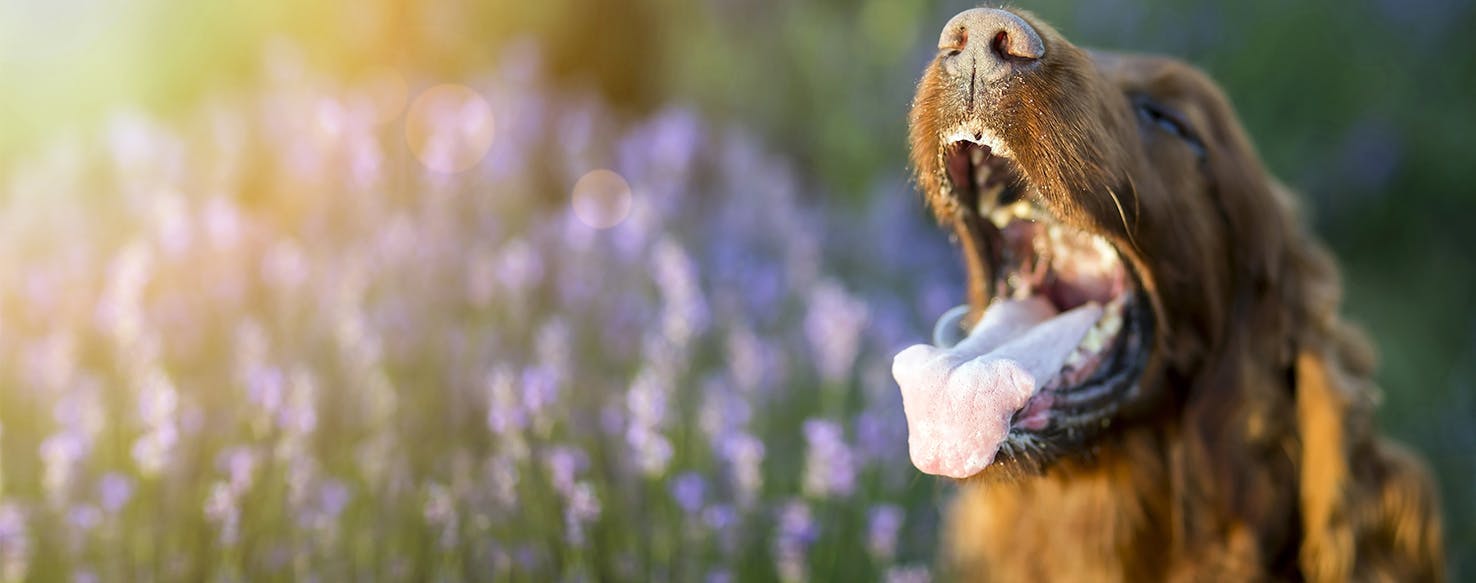- Home
- The Daily Wag!
- Behavior
- Why Do Dogs Foam At The Mouth

Unusual
Concerning
You get home after taking your dog for a run and you notice some frothy saliva on your dog's mouth. Or, maybe you’ve noticed some foam around your dog’s mouth when they are in the car or at the park? You know that foaming at the mouth is often associated with rabies in dogs, but is that the only reason for this weird behavior? Why else do dogs foam at the mouth? The truth is, foaming at the mouth is rarely a result of rabies, even though most people might instantly associate foaming at the mouth with rabies. So what else could cause this mysterious behavior? Should you be concerned?
Foaming at the mouth is not just an indicator of rabies for dogs. Dogs may foam at the mouth for a number of reasons, from completely normal behavior to something that may indicate a more serious condition. How can you tell the difference?
More commonly, dogs foam at the mouth from stress or simple exertion. Extended or intense exercise may cause a dog to pant and salivate excessively, which causes foaming at the mouth. Stress may also cause a dog to foam at the mouth as a response to stress, due to rapid breathing and excessive drooling. If you notice your dog foaming at the mouth when you take him to a new place, take a car ride, or isn’t getting enough exercise, stress may be a factor. Watch for other indicators of stressed behavior, such as chewing or digging. Sometimes, a dog may foam at the mouth if they have eaten or tasted something bad. A dog with an upset stomach or a bad taste in his mouth may pant or drool excessively, which may result in foaming at the mouth. A dog may also foam at the mouth if they ingest something poisonous. If your dog is exhibiting any other unusual symptoms, consult a vet to be sure your dog has not consumed anything toxic. Some of these symptoms include vomiting, diarrhea, high body temperature, rapid heart rate, and lack of appetite.
Seizures are another possibly dangerous cause of foaming at the mouth. While many dogs experience seizures at some point in their lives, and some even have chronic seizures, called epilepsy. Some breeds have a higher risk of developing epilepsy, including Labradors, Beagles, and Vizslas. Seizures can be also be caused by ingesting something toxic, including certain nuts and other foods that are toxic to dogs. Consult a vet for a more thorough list of toxic human foods.
Need advice about your pet's health?
Get answers fast from a veterinary professional 24/7 in the Wag! App.
Get Vet ChatFoaming at the mouth by itself isn’t inherently bad or dangerous. It might be innocuous, or it may indicate a more serious problem. Monitor your dog to make sure they’re eating and drinking normally, and isn’t exhibiting any other odd behaviors. If your dog foams at the mouth with routine exercise, ensure your dog is sufficiently hydrated before and during your exercise. That may help reduce the excessive drooling and panting that causes foaming. If you’re out for an extended period, make sure your dog has access to drinking water. If the heat is excessive, try to give your dog an opportunity to cool off, either in shade or a source of fresh water.
Though rare, rabies can cause a dog to foam at the mouth. Rabies can be spread between animals through a bite, though it can also be transferred from saliva into any open wound. Seizures in dogs may cause significant physical symptoms, including excessive drooling and panting (which causes foaming), falling over, spontaneous kicking of limbs, repeated biting or jaw clenching, and spontaneous urinating or defecating, in addition to muscle twitching or convulsing. It is important to consult a vet if you think your dog has had seizures, in order to determine the cause and potential treatment.
The most common hosts for rabies are animals such as bats, raccoons, skunks, and foxes. If you live in an area where these critters are common, ensure your dog’s vaccinations are up-to-date. Two forms of rabies, furious and paralytic, both cause noticeable changes in your dog’s behavior. Depending on your dog’s usual behavior, they may exhibit sudden lethargy and unresponsiveness or aggression and short-temper. If you suspect your dog may have come into contact with a rabid animal, it is crucial to seek veterinary assistance immediately, although it is difficult if not impossible to cure. The best treatment is prevention, making sure your dog’s annual rabies vaccination is up-to-date.
While not normally a cause for concern, foaming at the mouth can accompany a number of other potentially dangerous conditions. If your dog only foams at the mouth during play time or in the car, their foaming at the mouth is probably innocuous. If you see someone else’s dog foaming at the mouth, don’t automatically assume rabies. Some dogs are just easily excitable or playing hard.
Written by Darlene Stott
Veterinary reviewed by:
Published: 02/07/2018, edited: 05/21/2021
More articles by Darlene Stott

